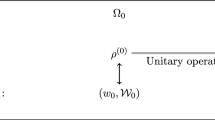Abstract
Quantum information has suggested new forms of quantum logic, called quantum computational logics, where meanings of sentences are represented by pieces of quantum information (generally, density operators of some Hilbert spaces), which can be stored and transmitted by means of quantum particles. This approach can be applied to a semantic characterization of epistemic logical operations, which may occur in sentences like “At time \(\mathfrak t^{\prime }\) Bob knows that at time \(\mathfrak t\) Alice knows that the spin-value is up”. Each epistemic agent (say, Alice, Bob,...) has a characteristic truth perspective, corresponding to a particular orthonormal basis of the Hilbert space \(\mathbb {C}^2\). From a physical point of view, a truth perspective can be associated with an apparatus that allows one to measure a given observable. An important feature that characterizes the knowledge of any agent is the amount of information that is accessible to him/her (technically, a special set of density operators, which also represents the internal memory of the agent in question). One can prove that interesting epistemic operations are special examples of quantum channels, which generally are not unitary. The act of knowing may involve some intrinsic irreversibility due to possible measurement procedures or to a loss of information about the environment.We also illustrate some relativistic-like effects that arise in the behavior of epistemic agents.

Similar content being viewed by others
Notes
As we will see, the application of a classical reversible gate to a register \(\vert {x_1,\ldots ,x_n} \rangle \) transforms the (canonical) bit \(\vert {x_n} \rangle \) into the target bit \(\vert {x_n^\prime } \rangle \), which behaves as the final truth value. This justifies our choice in Definition 1.
Quantum channels represent particular cases of quantum operations. The concept of quantum operation is a quite general notion that permits us to represent at the same time symmetry transformations of quantum states, effects and measurements. In particular, it has been shown that for open systems, interacting with an environment, the Schrödinger equation should be generalized to a superoperator equation, describing how an initial pure state evolves into a mixed state, transformation that has the form of a quantum operation. See, for instance, Chiribella et al. (2008), Fan and Hu (2009).
This definition is based on the so-called Kraus first representation theorem. See Kraus (1983).
References
Beltrametti E, Dalla Chiara ML, Giuntini R, Leporini R, Sergioli G (2012) Epistemic quantum computational structures in a Hilbert-space environment. Fundam Inf 115:1–14. doi:10.3233/FI-2012-637
Beltrametti E, Dalla Chiara ML, Giuntini R, Sergioli G (2012) Quantum teleportation and quantum epistemic semantics. Math Slovacca 62(6):1–24
Beltrametti E, Dalla Chiara ML, Giuntini R, Leporini R, Sergioli G (2014) A quantum computational semantics for epistemic logical operators. Part I: epistemic structures. Int J Theor Phys 53(10):3279–3292
Chiribella G, D’Ariano GM, Perinotti P (2008) Transforming quantum operations: quantum supermaps. Lett J Explor Front Phys 83:30004-p1–30004-p6
Dalla Chiara ML, Giuntini R, Leporini R (2005) Logics from quantum computation. Int J Quantum Inf 3:293–337
Dalla Chiara ML, Giuntini R, Leporini R, Sergioli G (2015) A first-order epistemic quantum computational semantics with relativistic-like epistemic effects. Fuzzy Sets Syst (submitted)
Fan H, Hu L (2009) Infinite-dimensional Kraus operators for describing amplitude-damping channel and laser process. Opt Commun 282:932–935
Kraus K (1983) Effects and operations states. Springer, Berlin
Acknowledgments
We would like to thank Enrico Beltrametti, Maria Luisa Dalla Chiara and Roberto Giuntini, who have deeply discussed this paper with us, proposing some useful suggestions. Sergioli’s work has been supported by the Italian Ministry of Scientific Research within the FIRB project “Structures and dynamics of knowledge and cognition”, Cagliari unit F21J12000140001 and by Regione Sardegna within the project ‘Modeling the uncertainty: Quantum Theory and Imaging Processing”; Leporini’s work has been supported by the Italian Ministry of Scientific Research within the PRIN project “Automata and Formal Languages: Mathematical Aspects and Applications”.
Author information
Authors and Affiliations
Corresponding author
Additional information
Communicated by M.L. Dalla Chiara, R. Giuntini, E. Negri and S. Smets.
Rights and permissions
About this article
Cite this article
Sergioli, G., Leporini, R. Quantum approach to epistemic semantics. Soft Comput 21, 1381–1390 (2017). https://doi.org/10.1007/s00500-015-1781-7
Published:
Issue Date:
DOI: https://doi.org/10.1007/s00500-015-1781-7




